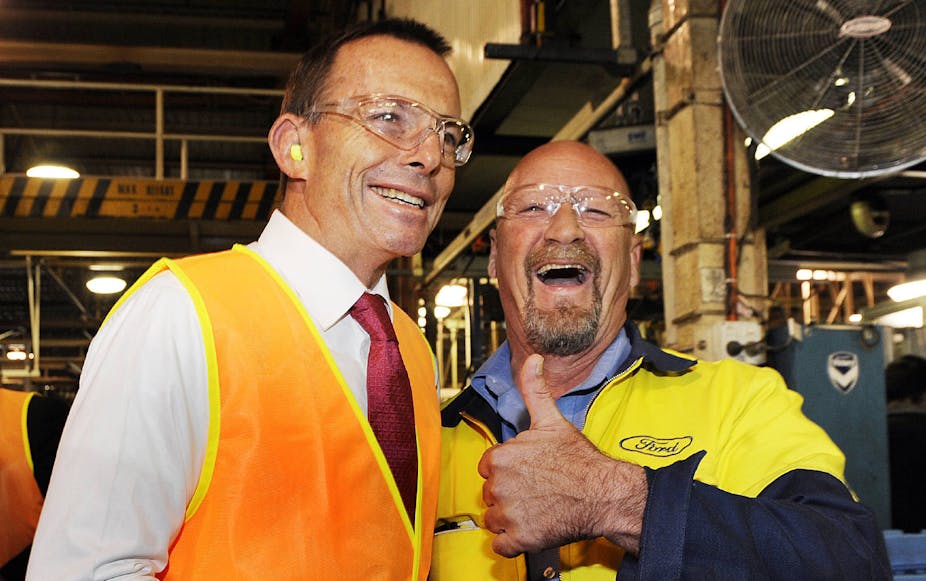Peter Reith’s recent column in The Age arguing that the Liberals need to revisit and radically change their industrial relations policy explains precisely why Tony Abbott did not support him for Liberal Party President. Abbott obviously shared Nick Minchin’s concerns that a Reith presidency would exhume WorkChoices, and with it the Liberal party’s political problem with industrial relations.
The Abbott Strategy
A key plank of Abbott’s electoral strategy is to wedge conservative working class voters away from Labor. Abbott is doing this in three ways.
Firstly, Abbott argues that the carbon tax will rip off ordinary families and destroy blue collar working class jobs. This fits with his argument that Labor is betraying its traditional supporters to pursue trendy, socially progressive Greens’ issues. It is the latest version of John Howard’s “Culture Wars” argument. This argument feeds on the perception that elite special interests are ripping off mainstream Australian taxpayers by extracting largesse from the government for socially progressive feminist and racial issues e.g. the Aboriginal “industry”. Nowadays, conservatives suggest that elite inner-city environmentalists (and government grant-seeking scientists from the so-called climate-change “industry”), are pursuing their own agendas at the cost of the working class.
Secondly, Abbott uses his masculinity to appeal to male blue collar workers in particular. The constant images of action-man Abbott, complete with hard hat and fluro safety vest, driving trucks, forklifts and talking in factories are precisely designed to suggest that he is more in touch with a blue collar male constituency than Gillard is.
Thirdly, following the strategy he master-minded during the Howard years, Abbott uses his devout Catholic image to try to win the blue collar christian vote from Labor over religious right issues. Given his past links with BA Santamaria, Abbott knows the role that the DLP played historically in keeping Labor out of office by wedging working class Catholic voters away from Labor.
Not so “dead, buried and cremated” after all?
Exhuming the spectre of WorkChoices would undermine this strategy just as it did in the 2007 Election. I have argued elsewhere (in Governing change: Keating to Howard, 2007) that WorkChoices fundamentally undermined the Liberal party’s attempts to wedge workers from Labor. WorkChoices undermined the Liberal’s strategy of focusing on alleged politically correct cultural elites ripping off ordinary taxpayers via government largesse.
Under WorkChoices, the central focus returned to class-based debates about exploitation i.e. arguments that workers were being exploited by unscrupulous employers in the workplace. This benefitted Labor and played to its traditional strength of arguing for workers’ rights. It also allowed the Labor party and ACTU to mount major fear campaigns.
In short, Howard had succeeded in fatally undermining his own framing of political issues. It was a spectacular own goal, particularly given that Labor has proved largely incapable of countering Liberal framings since. In fact, Gillard’s Labor government must have been praying for a Reith victory.
Will Abbott return to this ‘political mistake’?
We should, therefore, not be surprised that Abbott didn’t vote for Reith. After all, Howard introduced WorkChoices because he was genuinely committed to radical industrial relations reform since the 1970s. Howard’s ideological hubris also led him to believe that workers had been culturally transformed by the Howard years and would see WorkChoices as having benefits for them.
Despite his own support for key aspects of the policy, Abbott described WorkChoices as “a political mistake” in his post 2007 election book Battlelines. His challenge will be to placate the industrial relations hard liners in the Liberal party (who believe radical IR policies are essential for the Australian economy) while bringing in industrial relations changes that keep WorkChoices “dead, buried, cremated” in the public mind. Abbott’s argument in Battlelines suggests he may try to do this by promising a “no disadvantage rule” compared with pre-existing industrial conditions but how much such a guarantee would really be worth remains to be seen.

